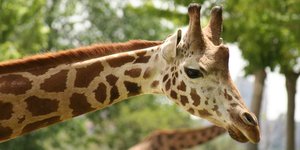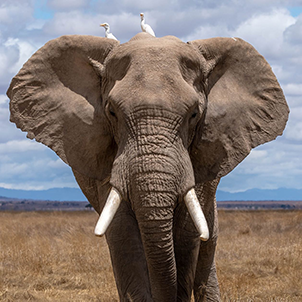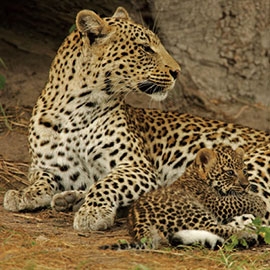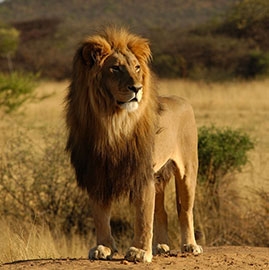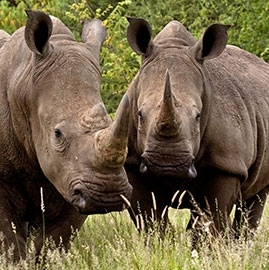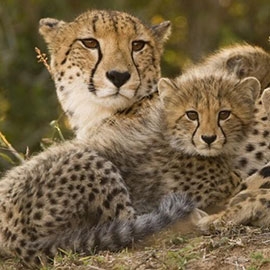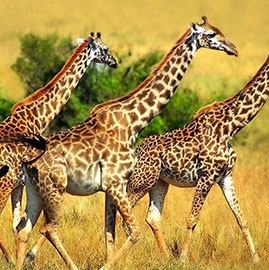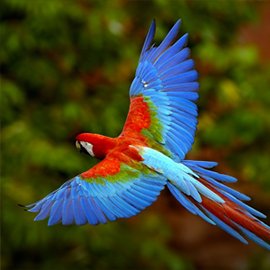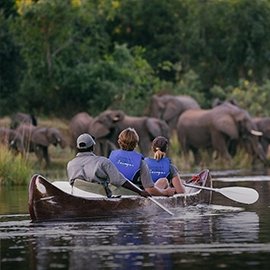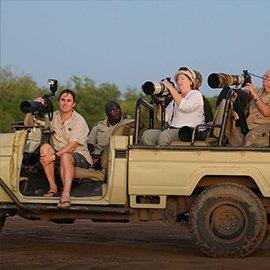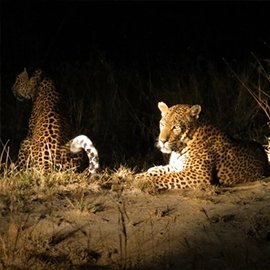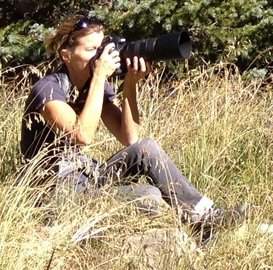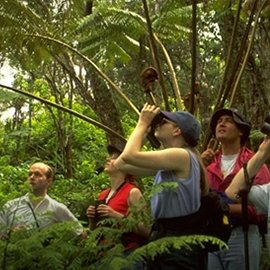Nyerere National Park
Safari suitability: 9/10
Find your tourAbundance of wildlife but remote location and limited lodging options.
What YAS members think
Highlights
- Renamed Nyerere in 2019 but formerly known as Selous Game Reserve
- Big five are here, but some are not as easy to spot
- Thick foliage obstructs wildlife viewing
- A vast, untrammeled wilderness
- Largely untouched wildlife and vegetation
- Opportunities for boat safari on Rufiji River
- Miombo woodlands
About Nyerere National Park
Situated in southern Tanzania, 200 km (124 miles) west of Dar es Salaam, the 54,600 km² (21,100 mile²) Selous Game Reserve (now Nyerere National Park and Selous Game Reserve) is known—among those who know it—for its wide-ranging, untrammeled wilderness and unspoiled wildlife and vegetation.
Selous Game Reserve history
Originally set aside by German colonialists, Selous was protected in the late 1800s, in 1917 named after hunter/explorer Frederick Courteney Selous and in 1982 declared a UNESCO World Heritage site.
In two highly-criticized turns of events, 2012 saw UNESCO agree to shrink Selous’ southern boundary to allow uranium mining, and a Memorandum of Understanding was signed to begin work toward construction of a hydroelectric power plant and dam at tourist-heavy Stiegler’s Gorge. Critics of each fear that these measures will spoil the currently unspoiled, harming the environment and keeping tourists at bay.
Large numbers of animals live, hunt and are hunted within this reserve, most of which was reserved for game hunting and fishing. In addition, a small portion of the park’s northern land was set aside for tourism and photography, and safari in the form of game drives, walking safaris and boat trips down the Rufiji presented opportunities for viewing wildlife.
Nyerere National Park
Selous was the largest protected area in Tanzania. In 2019, the Tanzanian government declared roughly 67% of it to be have national park status.The park was named Nyerere National Park, in honor of Tanzania's first president, Julius Nyerere. The main tourists areas and safari camps now fall in Nyerere National Park, with around 31,000 km² in total allocated to the new park. The remaining 24,000 km² continues to be Selous Game Reserve, putting a much smaller focus on game hunting.
Nyerere National Park wildlife
Elephant, lion, cape buffalo, black rhinoceros, cheetah and wild dog, giraffe, antelope, hartebeest, greater kudu, eland, wildebeest, crocodile and hippo are among the beasts that roam Nyerere.
Nyerere is home to Stiegler’s Gorge, which feeds the marvelous Rufiji River and its many wandering tributaries and lakes. Grasslands, savannah, wetlands, thickets and swamps constitute its truly biodiverse acreage, and Miombo woodlands root here.
When is the best time of year to visit Nyerere National Park?
The dry season, July to October, offers strong game-viewing opportunities. During the wetter months, January through May, the predators are dispersed throughout the reserve and the dense foliage makes it harder to spot them. It is also more humid during this time of the year.
I visited the Selous after having spent nearly two weeks in northern Tanzania. We had to take a very small (it was just the pilot and us) plane into the Selous from Dar es Salaam, so it's not as easy to get to as the northern parks are. As we were landing, a boy had to run out and chase a giraffe off the 'landing strip' (which was essentially soil). I will never forget my entrance into this park. The first thing that struck me was the difference in climate. Selous is very, very humid, unlike its northern Tanzanian counterparts which are arid. There are only a few camps that operate here, so you are limited on choice and nearly all of it is expensive. We stayed in Selous Safari Camp and it was great. We especially were fond of Andrew (aka Molly) who always put a smile on our face. What I was not fond of was the fact that we had to use the lodge's vehicles and guides. This meant sharing vehicles with other guests and using guides who were, for lack of a better word, apathetic. Because the humidity is much higher, the foliage was also much denser. This made animal sightings much more difficult. We did see many lions and hippos, but the calibre of animal sightings here is far inferior to that of the northern parks. What I loved about this park was its remote location. Aside from the other couple in our vehicle (who were cool), I saw no other vehicles. A big difference from the Serengeti.
Sort by:

After spending 3 days in Mikumi, we stayed 8 days in Selous, at the “Lake Manze camp”. This was our 5th safari stay in Selous, and the 3rd at Lake Manze camp. It was the first time in June. Lake Manze camp remains our favorite place to live in Tanzania. Alas, this time we saw few animals!! Despite the information collected by driver and guide, it was not possible to find the Lycaons, nor Leopard (but seen footprints...), and only one unfortunate Lioness in 8 days. Nevertheless, the atmosphere in Sélous is still fabulous. If I ever return to southern Tanzania, I will return to Selous at Lake Manze camp, but probably in September or October. Saw lots of birds and bee-eaters in particular. Attention: The Chinese are building a large airfield with terminal building near Mtemere Gate. There are already quite a few day safaris coming from Zanzibar. the phenomenon will increase and the atmosphere in Selous risks changing a lot.... ___________________________________________________ Apres avoir passé 3 jours à Mikumi, nous avons séjourné 8 jours à Selous, au "Lake Manze camp". C'était notre 5eme séjour safari à Selous, et le 3eme au Lake Manze camp . C'était la première fois au mois de Juin . Le Lake Manze camp reste notre lieu de vie préféré en Tanzanie . Hélas, cette fois nous avons vu peu d'animaux !! Malgré les informations collectées par chauffeur et guide, il n'a pas été possible de trouver les Lycaons, ni Léopard (mais vu des empreintes ...), et une seule malheureuse Lionne en 8 jours . Néanmoins, l'ambiance dans Sélous est toujours aussi fabuleuse . Si je retourne un jour en Tanzanie du sud, je retournerai à Selous au Lake Manze camp, mais probablement en septembre ou octobre . Vu beaucoup d'oiseaux et de de Guêpiers en particulier . Attention: Les chinois sont en train de construire un grand aérodrome avec aérogare près de la porte de Mtemere. Il y a déjà pas mal de safaris à la journée venant de Zanzibar. le phénomène va s'amplifier et l'ambiance dans Selous risque de beaucoup changer .... ...

As Dakado Tanzania Safari. I recently had the pleasure of exploring Nyere National Park and it truly exceeded my expectations in life Adventures. Here's a breakdown of my experience; 1. Scenery The park boasts breathtaking landscapes that left me in awe. From lush forests to serene lakes, every corner offers a picturesque view. The well-maintained trails allowed me to immerse myself in nature and discover hidden gems. 2. Wildlife Nyere National Park is a haven for wildlife enthusiasts. The park's commitment to conservation is evident, creating a harmonious environment for both visitors and the resident fauna. 3. Facilities The park's facilities are top-notch. Clean restrooms, well-marked trails, and informative signages made the visit comfortable and enjoyable. The visitor center provided valuable insights into the park's history, flora, and fauna. 4. Accessibility Getting to Nyere National Park was convenient, and the park's accessibility made it an ideal destination for a day trip or a weekend getaway. The well-paved roads and ample parking added to the overall positive experience. 5. Overall Experience Nyere National Park offers a perfect blend of natural beauty and tranquility. Whether you're a nature lover, hiker, or wildlife enthusiast, this park caters to all. I left feeling rejuvenated and inspired, and I can't wait to return for another adventure. It's enough to stay that, Nyere National Park is a hidden gem worth exploring. Its pristine beauty and diverse ecosystem make it a must-visit destination for anyone seeking a connection with nature.

Whether you are planning to land in Dar es salaam or Zanzibar, Nyerere is a perfect choice fo your next trip. This park offers the best wildlife experience if you chose a professional safari company to handle your trip. Lions, hippos, elephant and wildebeest are common here.

Nyerere, Sealous and Pemba Island We found Sue at Track Safaris following a google search and then our holiday of a lifetime was born through several conversations and some emails. Sue tailored our safari adventure to suit our requests and budget and we really appreciated how available and knowledgeable she was throughout the planning stage – this was so reassuring. We stayed at the Siwandu camp on the Sealous game reserve and then moved on to Jongomero camp in the Nyerere game reserve. Both camps exceeded our expectations, and it is difficult to do them justice through a review! The welcome we received and the way we were looked after by the incredibly friendly staff was second to none and in both camps, the game drives did not disappoint – our guides (Mporto in Siwandu and Giovanni in Jongomero) were knowledgeable and friendly, sympathetic and their knowledge of the area and experience meant that we were fully immersed in the whole safari experience. Both camps expertly ‘matched’ us with people for the game drives – we have friends for life in the couple we met at Siwandu! We never felt rushed or bored and saw the most incredible sights from really close vantage points. In both camps the food was outstanding and the accommodation akin to our experience of 5*. With the Masai escorting us and patrolling the camp at night we felt very safe, and a lasting memory will be falling asleep to the sound of hippos guffawing in the lake nearby! We celebrated our 30th Wedding Anniversary whilst at Siwandu camp and the staff went above and beyond to make us feel very special. We finished our holiday with 5 nights at The Manta Resort on Pemba Island. This was an ideal way to relax and reflect after the safari experience. Again, the staff were really friendly and could not do enough for us, the resort was quiet, the accommodation (beach side villa) superb and the food was outstanding. We saw a pod of dolphins and a humpbacked whale, and my husband went scuba diving under the excellent guidance of Mohammed. I am so glad my husband pushed me out of my comfort zone for this experience of a lifetime. We have both fallen in love with Africa.

Nyerere National Park, previously known Selous Game Reserve, is a wildlife park in the southern part of Tanzania. It one of the biggest parks and have abundant wildlife and awesome sceneries. I have visited and taken guests in the Nyerere park for years, and of course no one expected the number of animals available in this vast animal sanctuary. From the smallest of animals such as squirrels to the gentle giants of wild the elephants, this park never disappoints. Due to its size, it's easy to miss on important opportunities to see animals due to being scattered across the lands. However, the nature of animals is just like humans, they concentrate where there is abundant food and water, hence many groups of animals might be spotted in a single location and make it absolutely effortless to enjoy the view. The central part is one of the most beautiful landscape you can see in the park. Savanna like bushes with expansive natural vegetation that attract ungulates such as buffalo, zebras, kongoni and gazelles. The fact that this park receives way fewer tourists than its counterparts in the northern zone makes it everything anyone would like to see with a touch of privacy and serenity.
The largest game reserve in Africa, with lots of attractions such as the Great Rhuha and Rufiji Rivers. A boat ride is amazing. Lots of hippos, different species of birds. Walking with armed ranger in the nature trails. Seeing a pack of wild dogs hunting. It was very rewarding and productive.
 Tanzania
Tanzania
The Selous is the Largest game reserve in all of Africa, named after the great explorer Frederik Courtney Selous, who is incidentally, buried in the park at a grave site that can be visited by guests in the reserve. The photographic area of the Selous is in the northern part of the park, spanning about 3000sq km. The area is mostly flat and steady at about 50-60m above sea level. This means that the Rufiji River which runs through the park is slow and wide, producing a constant water source, which is great for wildlife! The park is located in the southern Safari circuit of Tanzania which is much less visited by tourists, which means no crowds and a much more authentic and pleasant experience. Selous Game Reserve is such a vast area,we spent hours driving around looking for the animals. While the wildlife population density isn't as high as it is in northern Tanzania, We still saw loads of animals including lions, elephants, giraffes, wildebeest, impala, hartebeest, greater kudu, zebras, buffalos, warthogs, hippos and crocodiles. Unfortunately we weren't lucky enough to see any leopards, rhinos or wild dogs during our safaris, but it gives me an excuse to go back there one day.
Selous Game Reserve is an unmatched, unchallenged and undisturbed game reserve. Selous is among the worlds largest game reserves and has a significant concentration of wild animals like elephants, wild dogs, lions, leopards, black rhinos, hippos and crocodiles. The view of sunset from the Rufiji River is as amazing as anything can be. Once you witness it you will never forget the experience. Selous is not as famous as other northern Tanzania's parks and you will find many vehicles in the reserve and that give you the feeling of actual wildlife and wilderness in the peace of Selous Game Reserve. You will actually feel that the game drives have been specially organised for you due to low density of vehicles in the park. You will love to watch hippos and crocodiles in Rufiji River.You will also witness the hundreds of birds species in the park. If you are going to Tanzania, Selous is among the must-visit parks.
The diverse Selous Game Reserve is one of the few places in the world whose ecology and biological processes are totally undisturbed by man. For that matter Selous Game Reserve is the 2nd largest remaining wilderness in Africa covering 44800kmsq. The life line of Selous is the river Rufiji which flows across the Reserve and covers the large parts of the wooded grasslands of the northern Selous, caused by the seasonal floods of the rising water of the Rufiji River. The grasslands creates a very dynamic ecosystem including a diverse range of wildlife with significant predator/prey relationships. Selous Game Reserve harbours one of the most significant concentrations of elephant, black rhinoceros, cheetah, giraffe, hippopotamus and crocodile, amongst many other species surrounding six lakes as well as hot springs. It is in fact a UNESCO world heritage site due to the diversity of its wildlife and undisturbed nature.
I had been to several of the northern parks of Tanzania numerous times already when I got a chance to explore the southern parks. Oh my, that was something I should have done way earlier! Okay I agree, if you want to go for the abundant wildlife, the incredible Great Migration, you should go to the Northern Parks. But if you already visited the Northern Parks, I would really suggest to try the Southern Tanzania on your next visit! I was lucky to travel to Selous in the time the TAZARA trains (Tanzania-Zambia Railway) were still running by schedule (more or less). A great experience on its own! The train ride felt like one big adventure, meals served in our cabin, having a drink at the bar in the train seeing the landscape passing by, the stops in the little village with the bursting colors of the womens khangas en kitenges who came to our windows to sell us fruits and snacks and of course the occasional stops: sorry a buffalo is on the trail, sorry elephants are blocking our way. And after this fantastic train ride, Selous National Reserve.... Wooow... you sometimes feel it is only you which is driving around. I mean I think on my first game drive in Selous, we actually met four other vehicles, three of which we met at the entrance gate and one when we were having our picnic break with a fantastic view over the lakes! Everything just feels wilder, animals react to the sounds of vehicles, except for the lions who just open one eye! And then, for me the absolute highlight: African Wild Dogs. My most favorite animal which always manage to capture me with their fantastic hunts, their well organised pack life! Oh and did I mention the game walk we did? Once on foot you realize an elephant is a truly majestic animal! And after all this excitement, what would one love better than sipping a cold gin-tonic while watching hippos in the Rufiji River?
Getting to Nyerere from Dar es Salaam
Most people who visit Nyerere-Selous do so via plane. All domestic flights go through Dar es Salaam, so even if you are coming from Arusha or Zanzibar, you will go via Dar. The flight is about an hour, non-stop, and the views en route are of gorgeous, thick treetops. The Rufiji River will then come into view and, if you're lucky, you'll see hippos in the water.
The following airlines travel to Nyerere National Park

As Salaam Air has grown to be a leading air carrier between the Tanzanian Islands. Our experienced team understands that customer satisfaction is important to the creation of a successful flight operation. Thus, we go above and beyond to satisfy our clients. The airline plies eight routes to promote tourism within and outside the country. We have two fuel-efficient aircraft Cessna 208B Grand Caravan and Embraer EMB 120 Brasilia, which are good for the environment and the safety of our clients.We would like to help you discover more about our Islands here on our website and at every step of your journey Visit website
Also flies to:


Auric Air Services Ltd is Tanzania's preferred corporate and safari airline with a wide network of domestic scheduled services with daily scheduled services to more than 30 destinations and handles approximately 8500 passengers every month. From its bases at Mwanza AirportMwanza, Julius Nyerere International AirportDar-es-salaam and Arusha Airport, Auric Air provides scheduled charter flights to some of the most remote and otherwise inaccessible destinations (parks & game reserves) within Tanzania. Visit website
Also flies to:




Coastal Aviation is an airline operating out of Dar es Salaam - charter flights. Coastal Aviation flying to some 100 strips located in some of the most isolated pockets of the East African Region. The scheduled Coastal network also connects visitors to Kenya, Uganda and Rwanda with the world-famous Serengeti, links the emerging tourism destinations of Mozambique with the Southern Tanzania parks of Selous and Ruaha, and unites the tropical island paradises of Pemba, Zanzibar, Mafia and Fanjove Private Iaslandwith the National Parks and towns of the mainland. Our state of the art fleet is composed of 20 aircraft and has been expertly-adapted to the African safari environment, without compromise to safety and comfort. Visit website
Also flies to:




Flightlink is a scheduled airline with Air Operator Certificate (AOC) and Air Service License (ASL) granted by Tanzania Civil Aviation Authority & Kenya Civil Aviation Authority to conduct Private & Scheduled Flight under Public Transport category within the region. All the aircraft in our fleet are chosen for their excellent safety records and their ability to perform in even in the most hostile conditions, so landing be it in the bush or on tarmac is not at all taxing. Visit website
Also flies to:


Premium Charter Service is an air charter broker based in Tanzania. We offer our valued clients a truly exclusive flying experience, one that combines luxury with the convenience of flying privately. Our network of domestic and international operators adheres to strict standards of quality. We deliver a superior experience to our clients with a high level of professionalism. Visit website
Also flies to:


Affordable Flights now connect the most remote and exciting parts of Tanzania - Zanzibar/Dar/Selous/Mikumi and Ruaha to Katavi and Mahale National Parks. Daily Flights from Zanzibar or Dar to Ruaha National Park via Selous or Mikumi. Visit website
Also flies to:

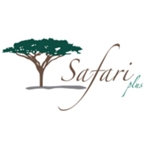
Safari Plus is Tanzanias first, Premium Charter operator in Tanzania positioned to offer unique flying experience while giving our customers flexibility and total control over their travel needs around the country and beyond. The Airline was established in 2009. 1 x Beechcraft King Air 350 with 8 Seats configured in executive club seating. 2 x Beechcraft 1900D with 18 Seats. Head office based in Dar es Salaam, Tanzania. Operating base at Julius Nyerere International Airport. Approved by the Tanzania Civil Aviation Authority to operate both; Scheduled Air Services and Non-Schedule Air Services (Charter Services). Visit website
Also flies to:


Premier safari airline and charter. Safarilink is Kenya's premier safari airline with a network of connecting domestic scheduled services to all the best safari destinations within Kenya and across the border into northern Tanzania. From it's base at Wilson Airport, Nairobi SafariLink provides daily scheduled flights to Masai Mara, Amboseli, Tsavo West, Naivasha, Nanyuki, Lewa Downs, Samburu, Lamu, Kilimanjaro, Loisaba, Migori and Diani Beach. Additionally it can also provide private charter flights if a client's particular requirement as regards destination or timing cannot be met by the scheduled services. Visit website
Also flies to:



TANZANAIR was formed in 1969 and pioneered aviation throughout Tanzania. Today it continues to live up to its slogan as theComplete Aviation Company. It was founded by Dinos J Samaras who managed the Company until he passed away in April 2010. It is now headed by his son John Samaras who was his deputy since 1983. With 45 years experience, TANZANAIR offers tailor-made air travel to suit the needs of its customers. With a modern fleet of twin and single-engine Cessna and Beechcraft turbine aircraft, TANZANAIRs well-established reputation leads the way in air charter services throughout the region. TANZANAIR operates out of its own purpose-built Passenger Terminal located between Terminal I and II at Julius Nyerere International Airport in Dar es Salaam. The passenger lounge is adjacent to the two hangars. It is housed within a secure wall enclosed compound with ample parking facilities. Visit website
Also flies to:


ZanAir Limited is a domestic airline based in Zanzibar. Since their inaugural flight in 1992, ZanAir has continued to establish a quality reputation, serving esteemed clientele. ZanAir is an acknowledged expert within Tanzania serving all destinations, including remote unpaved bush locations. Visit website
Also flies to:


Flown by an international team of pilots, Zantas Air has one of the youngest fleets of Cessna Grand Caravans in Tanzania. These are maintained to the highest safety standards and comply with the ICAO, CESSNA, and TCAA directives. We have an exclusive lounge at Arusha airport. Guests can relax in our comfortable lounge while they wait for their flight. Our operations are designed to suit our client's needs with a customized itinerary based on their schedule. Zantas Air works with its sister company, Mbali Mbali Lodges and Camps, to offer shared charter flights. We fly passengers from Northern Tanzania to Western Tanzania twice a week on Monday and Thursdays. Visit website
Also flies to:

Nyerere (Selous) map
Nearby parks and game reserves
Related articles
Latest photos

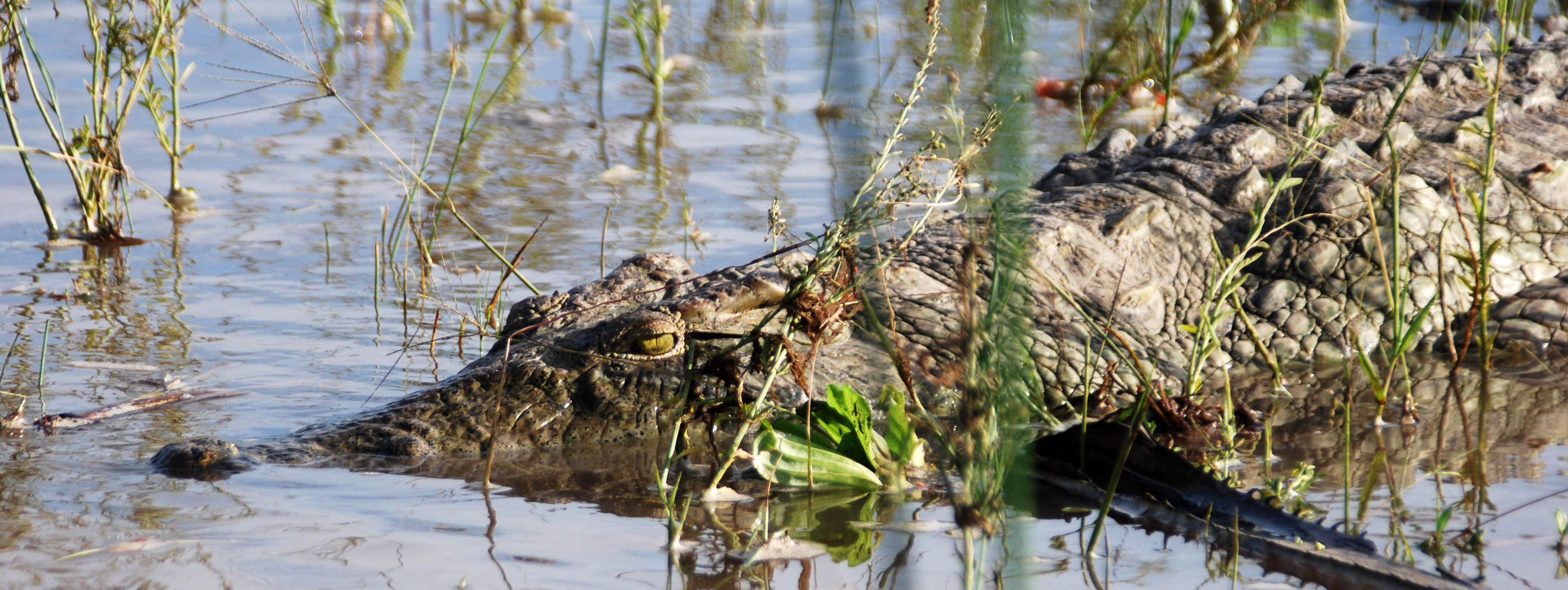
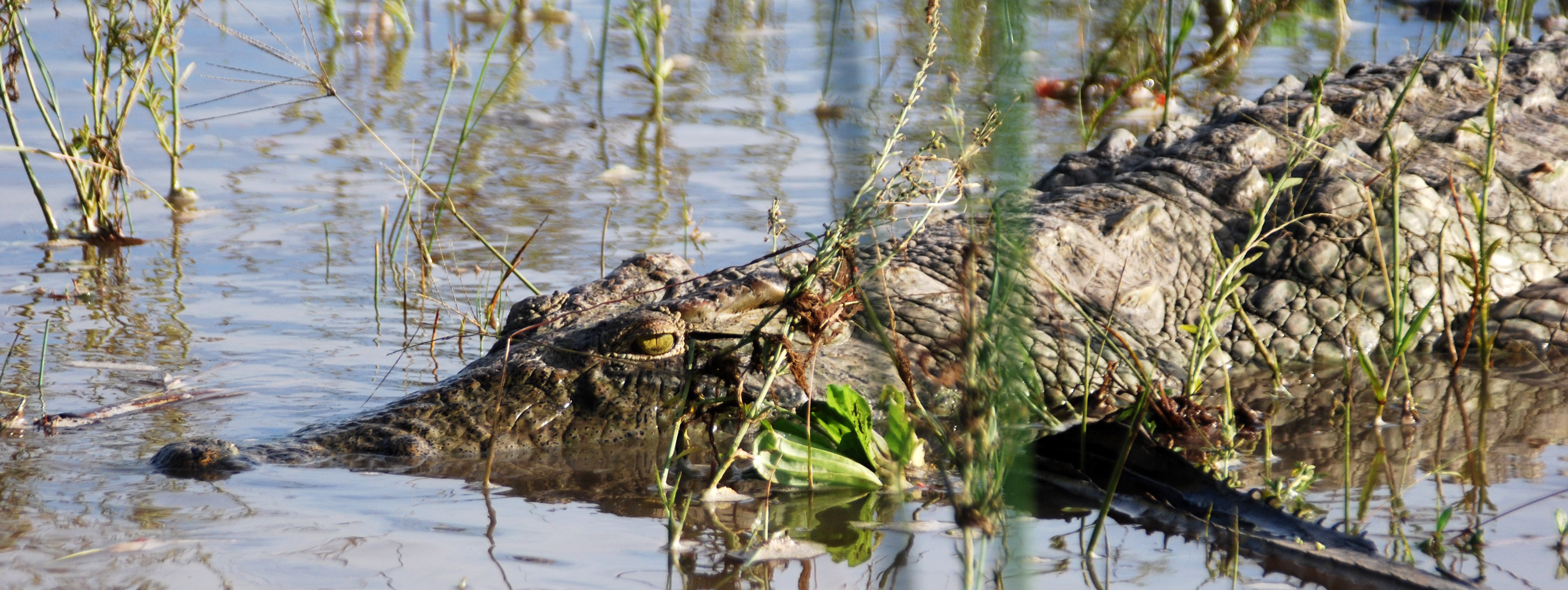
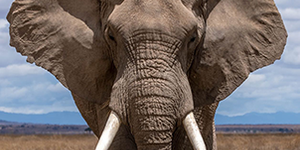
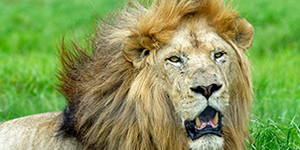
 Kenya
Kenya

